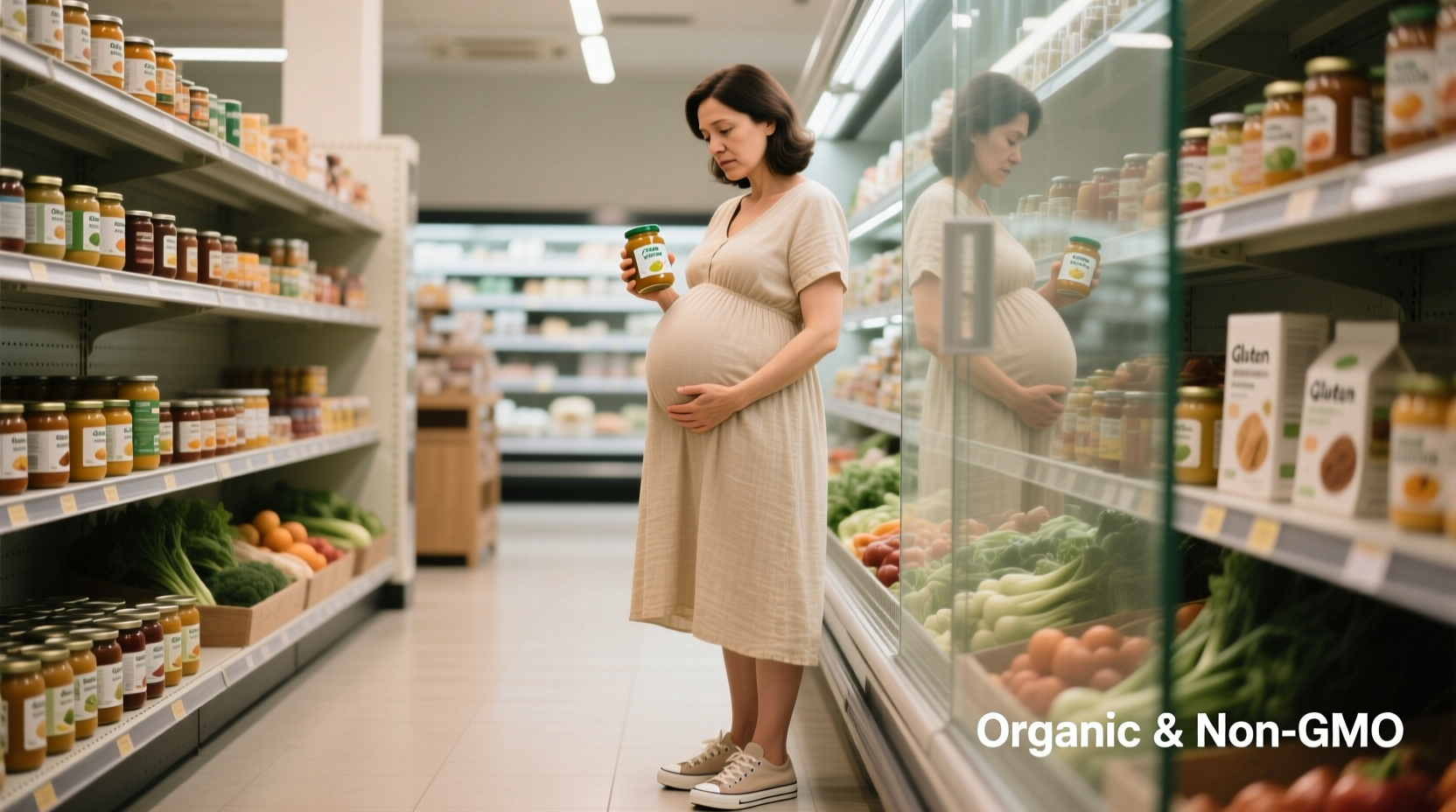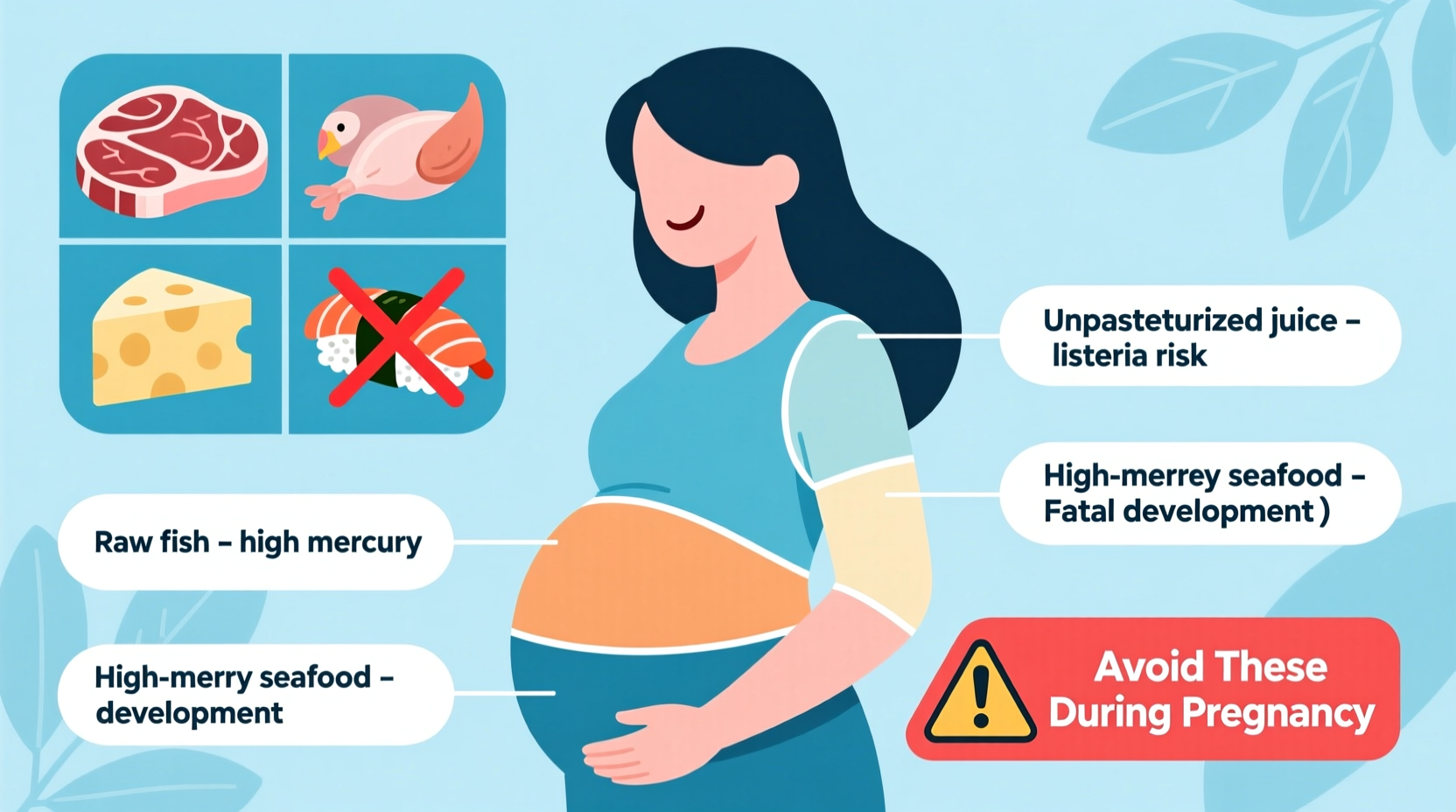During pregnancy, avoid these critical foods: raw or undercooked meat, unpasteurized dairy products, high-mercury fish (shark, swordfish, king mackerel), raw eggs, deli meats unless heated to steaming, and excessive caffeine. These foods pose serious risks including listeria, salmonella, and mercury exposure that can harm fetal development.
When you're expecting, every bite matters more than ever. Your food choices directly impact your baby's development and your own health. This guide delivers medically-reviewed information about what foods to avoid when pregnant, helping you navigate the complex landscape of pregnancy nutrition with confidence. We've compiled evidence-based recommendations from leading health authorities to keep you and your baby safe throughout all trimesters.
Understanding Pregnancy Food Risks: Why Certain Foods Are Dangerous
Pregnancy alters your immune system, making you more vulnerable to foodborne illnesses that could seriously affect your developing baby. According to the Centers for Disease Control and Prevention, pregnant women are ten times more likely to contract listeriosis than the general population. This bacterial infection can lead to miscarriage, stillbirth, or life-threatening infection in newborns.
Mercury exposure from certain fish can impair your baby's developing nervous system. The FDA and EPA jointly warn that high mercury levels can affect cognitive thinking, memory, attention, language, and fine motor skills in children.
| Food Category | Specific Items to Avoid | Primary Risk | Safe Alternatives |
|---|---|---|---|
| Fish & Seafood | Shark, swordfish, king mackerel, tilefish | High mercury content | Salmon, shrimp, pollock, catfish (2-3 servings/week) |
| Dairy Products | Unpasteurized milk, soft cheeses (brie, feta, blue cheese) | Listeria bacteria | Pasteurized milk, hard cheeses (cheddar, swiss) |
| Meat & Poultry | Raw/undercooked meat, deli meats (unless heated) | Listeria, toxoplasmosis | Thoroughly cooked meats (165°F internal temperature) |
| Eggs & Products | Raw eggs, homemade mayonnaise, cookie dough | Salmonella | Hard-boiled eggs, pasteurized egg products |
| Beverages | More than 200mg caffeine daily, alcohol | Developmental issues | Water, pasteurized juices, decaf coffee (limited) |
High-Risk Foods Explained: What You Need to Know
Understanding why certain foods pose risks during pregnancy helps you make informed choices beyond simple lists of what not to eat. Let's examine the science behind pregnancy food restrictions.
Raw and Undercooked Meats
Raw or undercooked meats may contain toxoplasma gondii, the parasite that causes toxoplasmosis. The American College of Obstetricians and Gynecologists reports that while most healthy adults experience mild symptoms, this infection can cause severe complications for your baby including vision loss, brain damage, and developmental delays.
Practical tip: Always cook meats to proper internal temperatures—145°F for whole cuts of beef, pork and lamb with 3-minute rest time, and 165°F for ground meats and poultry. Use a food thermometer for accuracy.
Unpasteurized Dairy Products
Soft cheeses made from unpasteurized milk carry significant listeria risk. The UK National Health Service emphasizes that listeria can survive refrigeration temperatures and cross the placenta, potentially causing miscarriage, premature delivery, or life-threatening infection in newborns.
When shopping, always check labels for "pasteurized"—this applies to both milk and cheese products. Hard cheeses like cheddar and swiss are generally safe even if made from unpasteurized milk because their aging process creates an environment unfriendly to bacteria.

High-Mercury Fish
The mercury timeline matters: exposure during the first and second trimesters when the nervous system develops rapidly poses the greatest risk. The Mayo Clinic explains that mercury accumulates in certain fish over time, with larger predatory fish containing the highest concentrations.
Context matters: while you should avoid high-mercury fish entirely, low-mercury options like salmon provide essential omega-3 fatty acids crucial for brain development. The FDA recommends 2-3 servings (8-12 ounces) of low-mercury fish weekly during pregnancy.
Safe Substitutions for Common Pregnancy Cravings
Cravings are normal during pregnancy, but satisfying them safely requires smart substitutions. Here's how to navigate common cravings while following pregnancy food safety guidelines:
- Cheese cravings: Choose hard cheeses like cheddar or swiss instead of soft cheeses like brie or blue cheese
- Sushi cravings: Opt for vegetarian sushi or cooked seafood rolls instead of raw fish options
- Delicatessen cravings: Heat deli meats until steaming (165°F) to kill potential bacteria
- Caffeine cravings: Limit to 200mg daily (about one 12-ounce coffee) and consider decaf alternatives
Special Considerations for Different Trimesters
While food safety matters throughout pregnancy, certain risks are more critical during specific trimesters:
- First trimester: Focus on avoiding listeria and toxoplasmosis as organ development occurs
- Second trimester: Continue strict food safety while increasing nutrient-dense foods
- Third trimester: Maintain food safety protocols as baby's brain development accelerates
Remember that individual health conditions may alter these general guidelines. Women with gestational diabetes, food allergies, or other medical conditions should follow personalized advice from their healthcare provider.
When to Consult Your Healthcare Provider
While this guide provides general pregnancy food safety information, your healthcare provider should be your primary resource for personalized advice. Consult them if:
- You've accidentally consumed a restricted food
- You experience foodborne illness symptoms (fever, diarrhea, vomiting)
- You have specific dietary restrictions or health conditions
- You're unsure about the safety of a particular food
Your obstetrician or a registered dietitian specializing in prenatal nutrition can provide tailored guidance based on your health history and pregnancy progression.











 浙公网安备
33010002000092号
浙公网安备
33010002000092号 浙B2-20120091-4
浙B2-20120091-4